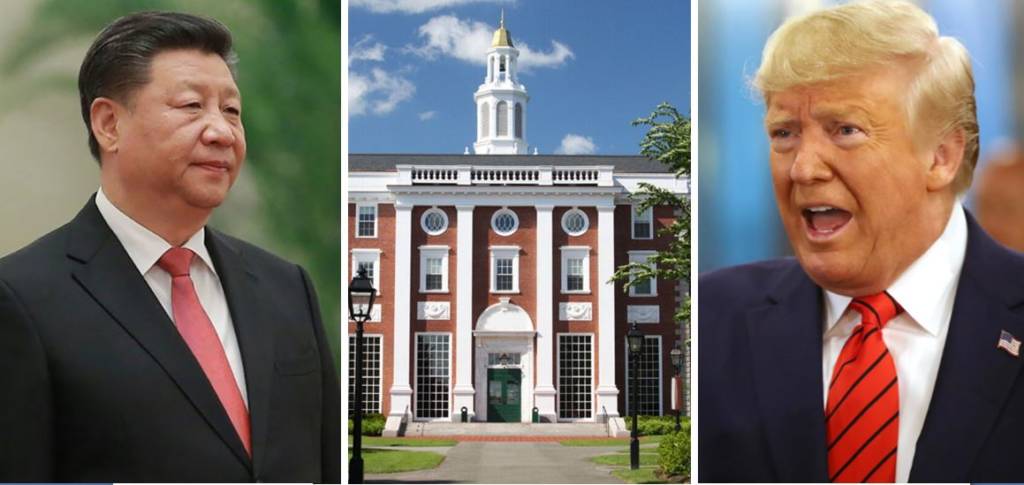With Beijing facing backlash for mismanaging the Coronavirus Pandemic and also misleading the entire world with a massive cover-up, China’s foreign education programmes have taken a hit. Countries across the world are speaking up against China and days after Sweden became the first European county to shut down China’s Confucius schools over security concerns, some really bad news is coming for Chinese students from the United States.
Senator Tom Cotton has suggested that Chinese students be denied visa to study science in the country. In an interview to Fox’s Sunday Morning Futures, the Senator said, “It’s a scandal to me that we have trained so many of the Chinese Communist Party’s brightest minds to go back to China, to compete for our jobs, to take our business and ultimately to steal our property and design weapons and other devices that can be used against the American people.”
Cotton then went on to suggest denying visa to Chinese students for studying science in the United States and said, “I think we need to take a very hard look at the visas that we give to Chinese nationals to come to the United States to study, especially at the postgraduate level in advanced scientific and technological fields.”
Cotton’s remarks must be viewed in light of growing concerns within the United States against Beijing’s attempts of intellectual property theft.
In 2018, for example, a chemistry professor at Harvard University, Charles Lieber, was arrested over failure to disclose his close ties with Beijing. In January this year, the Justice Department filed an indictment against him for failure to disclose the funding that he was receiving from China under its “thousand talents” program.
China’s talents program funds American scientists but the US has charged numerous beneficiaries of this funding program with intellectual property theft.
In fact, the booming “reverse technology” market in China itself is alleged to thrive on intellectual property theft by Beijing. Even members of the United States government had held a conference in Washington in February to discuss the issue of intellectual property theft by Chinese nationals and firms, both from the American tech giants and the academia.
Speaking at the said conference John Demers, Assistant Attorney General for National Security had said, “The threat from China is real, it’s persistent, it’s well-orchestrated, it’s well-resourced, and it’s not going away anytime soon.”
FBI Director Christopher Wray, too had raised alarm over the issue of Chinese intellectual property theft, saying, “This one to me really stands out as the greatest long-term threat to our nation’s information and intellectual property, and to our economic vitality.”
The US Department of Justice had launched China Initiative Campaign in the year 2018 to investigate this issue and according to the FBI, the cases of Chinese intellectual property theft have been piling up and currently the Federal agency is investigating over 1,000 such cases.
Academia is one vulnerable area when it comes to Beijing’s attempts to steal intellectual property that is actually owned and funded by the United States, but which gets patented in China if and when the Dragon is able to steal it from the American University campuses.
Even the Federal Bureau of Investigation (FBI) has alerted American University campuses about visiting research scholars stealing intellectual property on behalf of Beijing.
Justice Department’s top national security official, Assistant Attorney General John Demers recently said, “When we go to the universities, what we’re trying to do is highlight the risk to them without discouraging them from welcoming the researchers and students from a country like China.”
A Chinese Professor who taught at the University of Texas was charged with stealing state of the art technology from a Silicon Valley firm. He had turned out to be a secret agent for Chinese tech major Huawei, which is blacklisted in the United States over security concerns.
One-third of all international students in American Universities happen to be Chinese citizens and the United States is actually a major learning attraction for China that grapples with a huge supply of students willing to spend.
Geopolitics has been already taking a toll on ambitions on Beijing’s ambitions of sending its students to American Universities. Trump administration in the United States has already tightened visa norms and intensified scrutiny for research collaborations between Chinese and American academicians, as part of the trade war between the two countries.
The accusations of intellectual property theft being levelled against Beijing are not helping it either.
In 2018, the United States showed first signs of keeping Chinese students and researchers at bay when the Trump administration shortened visa duration for Chinese students pursuing graduation in aviation, robotics, and advanced manufacturing from five years to one year.
The reason for shortening visa duration was again intellectual property theft. The US intelligence agencies continue to warn University administrations about the threat of spying by teachers and students, of course, in the larger backdrop of Beijing’s attempts to lay hand upon American work and get it patented in China.
The American agencies have been urging for sensitization of academicians and University administrators against threats of intellectual property theft, so that they can identify and thwart such attempts.
In this context, the Coronavirus Pandemic has come at a very wrong time for Beijing. There was palpable sentiment against Chinese students in the country and that has worsened with the hostile political climate against the Dragon due to the mishandling of the COVID-19 outbreak.
